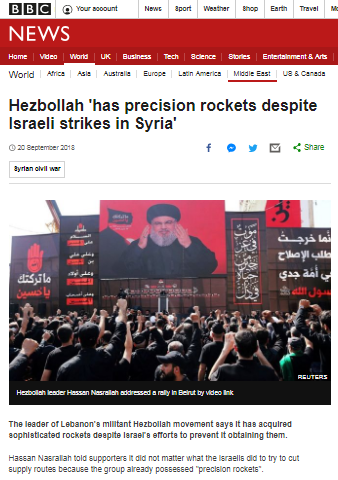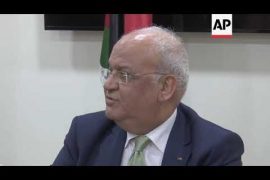Readers may remember that earlier this month the BBC’s Middle East editor Jeremy Bowen told listeners to three separate editions of a programme broadcast on both BBC Radio 4 and BBC World Service radio that the recent Hamas-Fatah unity deal is part of a ‘new’ Fatah strategy which includes additional aspects.
“Hamas was running out of options. What it had left was ending the split with President Mahmoud Abbas of Fatah. His side had concluded that the latest round of talks with Israel was going nowhere – like all the others over twenty years or more. So unity seems to be part of a new strategy for President Abbas and his people. It includes joining international organisations which could eventually lead to war crimes prosecutions of Israeli soldiers.” [emphasis added]
Bowen was presumably referring to the possibility of the Palestinians joining the International Criminal Court (ICC).
That court’s former chief prosecutor, Luis Moreno-Ocampo, gave an obviously more professional and learned appraisal of the hypothetical scenario promoted by Bowen during a recent visit to Israel, as Ha’aretz reported.
“Last week, on his first visit to Israel, Moreno-Ocampo was full of praise for the local legal system and eager to point out that joining the ICC could backfire for the Palestinians. […]
But he isn’t at all sure that if the Palestinian Authority were to join the ICC — or if Israel were to join, for that matter — the international court would actually play an active role in the conflict.
The ICC’s job is to investigate and prosecute only in cases in which the local legal system is not performing. “In a dictatorship they can make you disappear and kill you,” said Moreno-Ocampo. “But here, even if the situation is awful, you cannot disappear; you have the rule of law.” […]
For the ICC to rule on Israel’s activities, he said, “the Palestinians have to prove that the [Israeli court’s] decision was to shield the defendants. They would have to prove that it wasn’t a fair proceeding.” […]
“And the Palestinians should ask themselves how they would do it, because if you want to include everything since 2002 [when the ICC was established], that could include things done by the Palestinians. Another alternative is to start from 2015, not investigate past events and now that Hamas is part of the government, that would prevent them from committing more crimes.” “
For additional comprehensive background on the limitations of the ICC, see this paper by Professor Eugene Kontorovich from 2013.
The BBC Middle East editor’s job description was described by the corporation’s news editors in 2006 thus:
“Jeremy Bowen’s new role is, effectively, to take a bird’s eye view of developments in the Middle East, providing analysis that might make a complex story more comprehensive or comprehensible for the audience, without the constraints of acting as a daily news correspondent. His remit is not just to add an extra layer of analysis to our reporting, but also to find stories away from the main agenda.”
BBC licence fee payers might therefore feel entitled to expect rather more factually based and informative reporting from Jeremy Bowen than his above banal “war crimes” statement (which some might consider a mere regurgitation of PLO-NAD press releases) actually provides.
This is not the first time that the BBC has promoted the scenario of the possibility of prosecution of Israelis at the ICC: it also did so in a 2012 backgrounder titled “Q&A: Palestinians’ upgraded UN status” and in that simplistic and factually flimsy item too, the point that retroactive legal actions could include acts of Palestinian terrorism perpetrated since 2002 was not communicated to BBC audiences.
“If they are allowed to sign the ICC’s founding treaty, the Rome Statute, the Palestinians hope prosecutors would investigate alleged crimes against humanity and war crimes.” […]
“Technically a state joining the ICC also has the option of granting jurisdiction retroactively to the date when the treaty came into force – on 1 July 2002.
So the Palestinians might seek to have the ICC investigate war crimes allegations from the 2008-2009 Gaza war, as well as the most recent conflict in Gaza.”
If the BBC is going to wade into the issue of the strategy of ‘lawfare’ being pursued by the Palestinian Authority, it obviously must also inform audiences of the ICC’s actual mandate and limitations, as well as of additional potential scenarios such as, for example, the prosecution of PA officials connected to acts of terror during the second Intifada. At present, those aspects of the story are not being presented to BBC audiences, not even by the Middle East editor responsible for making “a complex story more comprehensive or comprehensible for the audience”.




